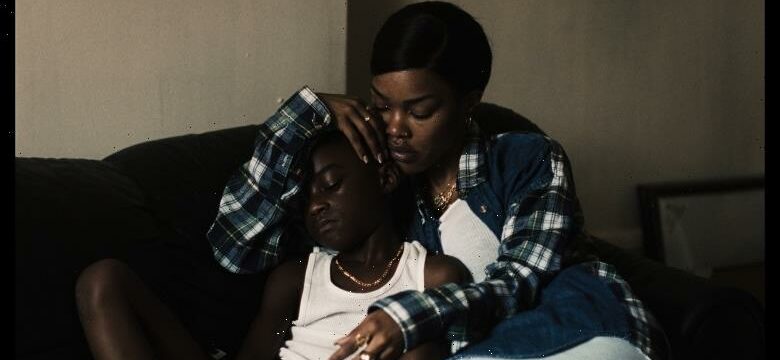There are two bruising lines that bookend first-time feature director A.V. Rockwell’s “A Thousand and One,” a vivid portrait of Harlem life from the early 1990s to the mid-2000s.
“There’s more to life than fucked-up beginnings,” Inez, a woman living life in New York on her own terms and brilliantly played by R&B super-artist/actress Teyana Taylor, tells her young son Terry (Aaron Kingsley Adetola). She has kidnapped him out of the foster care system, which has kept them separated after her stint in Rikers Island beginning in 1993, and now hopes to give him a better life. But at the end of the movie, after a decades-spanning, bittersweet bond forms and fizzles between them and shattering revelations are had, she tells the older Terry (Josiah Cross), “I fucked up. Life goes on. So what?”
Rockwell’s direction is sophisticated and visually imaginative even as the movie could benefit from a tighter edit around its New York cast of characters and the rapidly changing city in the hands of mayors Rudy Giuliani and Michael Bloomberg.
Inez, out of jail and a job, learns that Terry is in hospital after falling out a window trying to escape his foster parents. “Would it make you feel better if you came to stay with me?” she asks the small boy. “I’ll go to war for you, against anybody, against this whole fucked-up city.” And so it’s Inez and Terry against the city, even as Inez tries to bring a paternal figure into the child’s life by marrying Lucky (William Catlett), her on-and-off-again romantic partner. As Terry gets older, he bonds with Lucky over a shared love of music, and Lucky becomes as much of a father to Terry as he possibly could. But in the background, Lucky and Inez’s relationship has its own complications. And meanwhile, reports of Terry’s abduction loom around their lives.
Terry, in his teen years, shows a preternatural giftedness in school that catches the notice of his teachers, including a kindly one played by Delissa Reynolds (restrained but emotionally potent here). An abandonment complex seems to prevent Terry from wanting to succeed, though Inez, in another showcase of a moment for Taylor, pushes him to apply to a better school.
Curiously, “A Thousand and One” mostly elides the particulars of September 11, even though its shadow looms over the movie’s last act. Inez and Terry continue to live in a crummy apartment that’s been taken over by a white landlord, who promises largesse before he turns out to be another purveyor of gentrification’s soul-crushing machine.
Cinematographer Eric K. Yue, working with the Arri Alexa Mini, lenses New York across two decades with a mix of vintage and contemporary lenses. As Inez and Terry’s world becomes darker and their relationship more strained and distant, so do their visual surroundings. Yue and Rockwell seem indebted to both the iconic 1970s cinema of New York streets and the Black American cinema revolution of the early 1990s. There hasn’t been a New York movie this vividly articulated since Kenneth Lonergan’s “Margaret,” though overheard shots of the cityscape, while witnessing its mutations and evolutions, tend to feel meandering.
Terry and Inez’s story is only one of many, but it serves as a microcosm for the specific economic struggles of any Black lower-middle-class Americans trying to keep up with gentrification’s engine and NYPD indifference to Black people. “A Thousand and One” culminates in a gutting conclusion that turns the entire movie on its head — it’s one best left entirely unspoiled — and serves as a sobering reminder of how fucked-up beginnings can hopefully bring about better endings. Cross is effective in a key scene surrounding this revelation, but it’s Taylor who anchors Rockwell’s direction and screenplay with her powerhouse performance. Taylor has worked with the likes of Tyler Perry in comedies, but it’s her seeming kinship with Rockwell (and Taylor’s own story as a New Yorker) and a performance as fiercely committed to the project as Inez is to Terry that signal a major acting talent.
Grade: B
“A Thousand and One” premiered in the 2023 Sundance Film Festival U.S. Dramatic Competition. Focus Features will release the film later this year.
Source: Read Full Article
